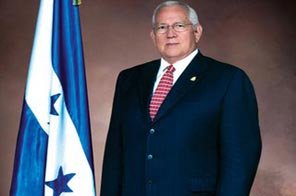Honduras to revoke rights curb
EGUCIGALPA: Honduras' de facto government took a step closer Monday to substantive dialogue with ousted President Manuel Zelaya, announcing it planned to revoke a decree restricting civil liberties.
"It is my decision to rescind the decree, but we'll take the decision with the council of ministers today," de facto president Robert Micheletti said in an interview broadcast on Honduran television.
Micheletti imposed the decree suspending freedom of movement, assembly and speech on September 27, using it to shut down two opposition media outlets and clamp down on protests by supporters of ousted president Manuel Zelaya.
Micheletti said he had decided to "totally annul" the decree because calm was returning to the country and because of the negative reaction of the international community.
Zelaya, who is holed up in the Brazilian embassy, had demanded that the decree be lifted ahead of talks brokered by the Organization of American States between his representatives and the de facto government that took power after a June 28 coup.
The talks are supposed to begin this week to discuss a settlement proposed by Costa Rican President Oscar Arias, calling for Zelaya's reinstatement and elections for his successor.
On Sunday, Zelaya told AFP in a telephone interview from the Brazilian embassy that 90 percent of the issues holding up negotiations "have been resolved."
But the ousted leader stipulated that for a "sincere" dialogue to begin with the interim government, civil liberties must be restored, the two pro-Zelaya media outlets reopened and soldiers must withdraw from around the Brazilian embassy.
He also insisted that he be allowed to chose his representatives for the negotiations.
Zelaya has spent the last two weeks, since his surprise return to Honduras, trapped in the Brazilian embassy with some 60 aides and reporters.
The compound is surrounded by security forces under the control of the Micheletti government, and Zelaya accused the de facto leadership of having "us imprisoned like in a concentration camp."
On Wednesday, 10 foreign ministers from the Organization of American States, as well as Secretary General Jose Miguel Insulza, will visit Honduras in an attempt to ease dialogue and pave the way for a restoration of democracy.
They are keen to negotiate a solution that will allow elections scheduled for November 29 to ahead as planned. Zelaya is constitutionally barred from seeking another term in office, but under the proposal put forth by Arias, he would resume the presidency until an elected successor takes office.
Zelaya called Monday on the de facto government to "immediately" sign the Arias proposal, but Micheletti has long resisted the deal because it would return to Zelaya to power, at least temporarily.
In a television interview Monday, Micheletti appeared to soften his stance.
"If there are transparent elections in the country and we elect a new president, we can talk about any scenario, any solution," he said.






